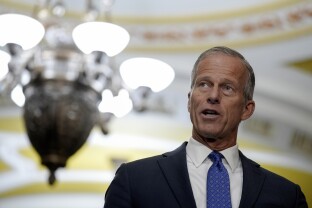It’s a tale as old as the Senate itself.
Republicans in the upper chamber are getting annoyed by the antics of their House colleagues, as lawmakers struggle to reach consensus on budget numbers, tax rates, even the number of bills it will take to enact Donald Trump’s legislative agenda.
But with Republicans waiting on the House to sort through its issues and adopt a budget, GOP senators are weighing an unusual move: going first.
In fact, Senate Republicans plan to tell Trump that they’re leapfrogging the House when they meet with the president Friday night.
“We’re going to talk to the president tomorrow night at dinner about why we’re moving ahead, and if the House can go with something bigger in the similar time frame, we’re for that,” Senate GOP Whip John Barrasso said on Thursday. “Our goal is to get something done now.”
While Trump has rushed through a stack of controversial executive orders to start his presidency, to achieve his chief campaign promises — securing the border, unleashing energy production and extending tax cuts — he will need Congress. With slim majorities in both chambers, the GOP’s only option to deliver hardline policy wins is reconciliation, the delicate budgeting vehicle that only requires a simple majority to pass either chamber.
From the start, Senate Republicans were pushing for a two-bill approach. Senate Majority Leader John Thune originally wanted an initial bill passed within the first 30 days of the Trump administration, with a second bill to follow shortly after.
But as the House and Senate approaches diverged, and House Republicans aimed for “one big, beautiful bill,” Senate Republicans became deferential. They said they’d give the House space to figure itself out first. That thinking isn’t uncommon, particularly in recent years as House GOP leadership has struggled to pass even basic legislation.
And yet, a few weeks into Trump’s second term, the GOP’s ambitious timelines are looking unrealistic. Senate Republicans are now calling for a contingency plan, and Senate GOP leaders are making moves on a budget of their own.
“We don’t want to keep losing valuable time,” said Sen. Shelley Moore Capito, a member of GOP leadership. “It’s been a couple weeks. I think some of us are getting anxious to keep moving forward.”
“If there’s frustration, it’s that the House hasn’t been able to do anything,” Republican Sen. Kevin Cramer said. “They haven’t been able to decide on a thing — not top line numbers on appropriations, not what the baseline should be for the Tax Cuts and Jobs Act extensions, and that still has to start with them.”
Of course, it’s unusual for the Senate to move first on legislation — Cramer himself called it “damned rare” — though it doesn’t mean the House actually has to agree to anything the Senate passes.
Sen. Josh Hawley took note that one chamber going before the other didn’t necessarily mean that would be the ultimate order of operations. The Senate could go, and then the House could just disregard that legislative outcome. “In which case, we’d have to do it all over again, which is not my favorite thing,” Hawley said.
“What would be ideal would be if House and Senate leadership could get on the same page here and agree what they’re going to do and when, and get after it,” he said.
That appears to be Trump’s preferred method, too. At a meeting with House Republicans on Thursday, Trump told members to figure out their strategy on reconciliation amongst themselves and come back to him when they had it.
Throughout the debate over reconciliation, Speaker Mike Johnson has maintained that the House should lead the process. But a lack of direction has been a real problem. A seemingly endless amount of meetings have frustrated both moderate and hard-line members, culminating with Rep. Byron Donalds rebuking Johnson on Wednesday in front of the GOP conference for how he handled the situation.
In a bizarre alliance, members of the fiscally conscious House Freedom Caucus have begun collaborating with Senate Republicans — behind Johnson’s back — to work on the two-bill path.
Sen. Markwayne Mullin — a close ally of Trump, Thune and many House Republicans — said there’s still an emphasis on giving the House its space to work, but that Senate Republicans are “going to have a contingency plan for if they can’t get it done.”
“You know, you’ve got 200-and-how-many members over in the House. You’ve got 53 here,” Sen. Ron Johnson said. “We’re all cats. It’s difficult to herd us. We’ve all got different ideas. We all think our ideas are the best. So there’s nothing easy about this process.”
As Johnson tries — again — to get Trump’s backing for his one-bill plan, some in the Senate believe the best thing they can do to help Johnson is exactly what he doesn’t want them to do. The House’s historically slim majority has the Senate in a desperate time, desperate measures mindset.
“We need to be ready with something in March,” Sen. Roger Marshall said. The Senate preempting the House just reflects that they “have the slimmest majority that’s possible over there.”
“Moses could not do a better job than Mike Johnson,” Marshall added. “It is really a challenge.”
—
Ursula Perano is a reporter at NOTUS. Ben T.N. Mause is a NOTUS reporter and an Allbritton Journalism Institute fellow.
Sign in
Log into your free account with your email. Don’t have one?
Check your email for a one-time code.
We sent a 4-digit code to . Enter the pin to confirm your account.
New code will be available in 1:00
Let’s try this again.
We encountered an error with the passcode sent to . Please reenter your email.


